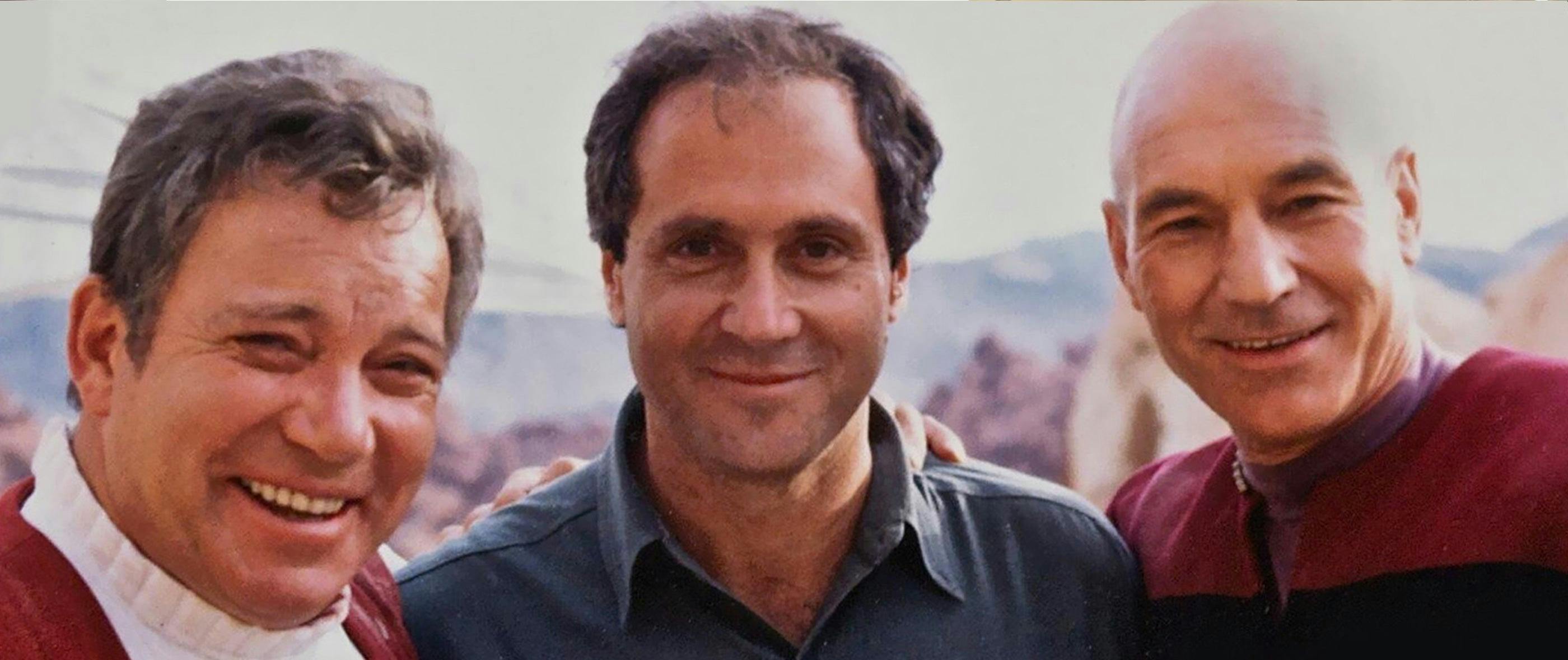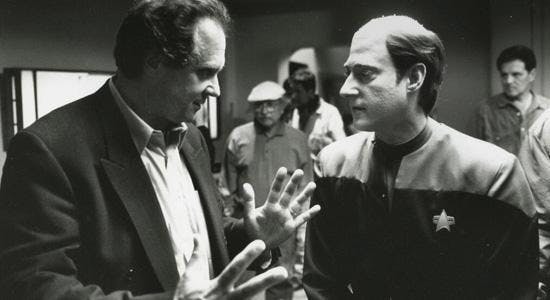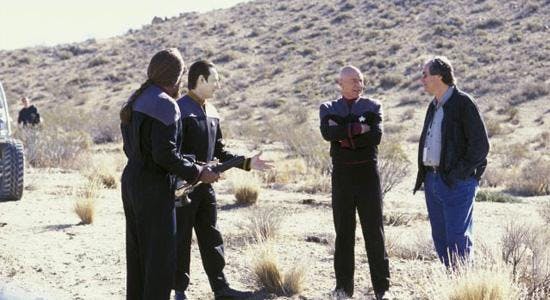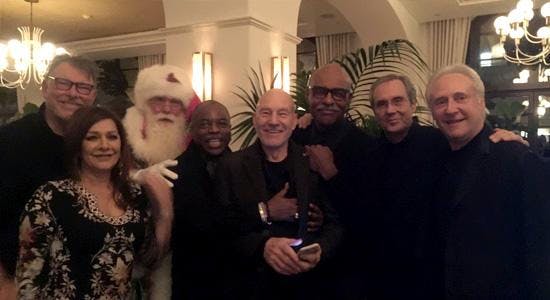Published Jun 18, 2018
Trek Directors' School: Rick Berman
Trek Directors' School: Rick Berman

What do Jonathan Frakes, Avery Brooks, Roxann Dawson, Rene Auberjonois, Michael Dorn, Gates McFadden, Patrick Stewart, LeVar Burton, Andrew Robinson, Robert Duncan McNeill, Tim Russ and Robert Picardo all have in common? Not only did they star/guest star on The Next Generation, Deep Space Nine, Voyager and/or Enterprise, but they directed episodes of Trek as well. To do so, each of them – beginning with Frakes – had to matriculate through Trek’s so-called “Directors’ School” and earn their shot. And the headmaster, so to speak, was Rick Berman, executive producer of TNG, DS9, Voyager and Enterprise. Berman established the unofficial program in order to prep his Trek actors to step behind the camera.
The result was some top-notch Trek hours, not to mention the development of several actors-turned-directors who are now among Hollywood’s most firmly established go-to directors, notably Frakes, Dawson, Burton and McNeill, while Russ has directed numerous shorts and indie features. Starting today, StarTrek.com will shine a spotlight on the “Directors’ School,” chatting first with Berman and, in coming weeks, several of the school’s graduates.
How, when, and why did the so-called directors’ school come about?
Jonathan Frakes, who I was very close to, personally and professionally, was very interested in directing. This was around season two. My theory on that was it was a slippery slope. There were a lot of potential pitfalls. What do you do if their episode is mediocre? On the other hand, actors were extremely good candidates for episodic directing simply because they lived their lives on the sets. They saw everything that went on, technically. Being actors, they knew everything that was going on dramatically, they spoke actor-ese and they’d see the technical elements of production and camera work going on. They seemed, in a sense, better candidates for potential directors than technical people. If a cameraman or an assistant director wanted to direct – and there are exceptions to this rule -- they know the technical elements, but they don't speak the actor-ese. They don't understand how, necessarily, to deal with actors and to deal with character work. It's much easier for an actor who's directing to talk to the director of photography or sound man or production designer, and get information of a technical nature than it is for an assistant director to have somebody to discuss, “How do I talk to an actor about his performance?” So, actors always seemed to me to be decent candidates for directing.
However, what I said to Jonathan was, "You need to spend some time shadowing other directors. You need to spend time going through the whole process, going through the script, going through pre-production and all the prep a director does, spending time with directors on the stage, spending time with the director as he's prepping each day's work and spending time with the director in editing." This was not always easy, because these actors were busy. They didn't have time to necessarily do that because they were working. So, they had to find time. And my feeling was if they really had a passion to do this, they’d make it their business to find time. At some point, whether it was Jonathan or me or somebody else, it became known as "going to school" prior to getting a directing assignment. Jonathan spent numerous episodes, when he was light in an episode, going to school. Even when he was busy and had a full load of pages on a specific episode, he’d find time, whether it was lunch hours, before work, after work, scenes he wasn't doing, to do all the things I mentioned before.

Who were some of the directors you had them shadow, and why those directors? Or was it just whoever was working?
It was whoever was working, but obviously it’d be better for them to shadow directors who were strong and directors who’d be nurturing. There would be some directors who wouldn't give a damn about some actor shadowing them around and then there’d be others who’d love to help them and to talk them through it. Corey Allen and numerous other directors in the early days I knew well enough to know that they’d be good to these actors who were shadowing them, and especially, specifically, Jonathan because he was the first. I encouraged Jonathan to then spend as much time with that director as possible. After multiple episodes of school, of working with directors on script work and prep and shooting and cutting, I, in talking to the directors that were being shadowed and in talking to people on the stage, talking to the director of photography, I got a feeling that Jonathan understood and was prepared, and we gave him his first shot. And he hit it out of the ballpark. He did a terrific job. That led to, obviously, additional assignments. You turn on television nowadays and you see so often that actors are directing. But it's difficult when you're acting and you have to be in scenes and you have to be prepping for scenes and be in makeup and in wardrobe and all that, and also be directing. But we’d try to find a way to make that work.
It felt like a number of your actors-turned-directors got great scripts to work with. How did you decide which script an actor received? Was that purely a function of where they fell in line in the director rotation, or was it random?
There really wasn’t a director rotation. The scripts the actors got, that was just luck of the draw.

Did the process you described evolve over the years from series to series, or was the template that you established with Jonathan pretty much what carried through to the very end?
It pretty much is what carried through to the very end. You have to remember, these actors spent hundreds of days a year on the set watching cameramen, watching lighting, watching how shots were set up, watching how setups were done and how many shots it would take to get a scene done, and at what point it would be too much and they would fall behind in terms of time. They would learn and they would see it and they were constantly observing because that's what they lived on the set. But they had to learn a lot more, and the process of what they had to learn was pretty basic. I don't think that that process changed from year to year or from show to show.
You had 12 actors who became directors. In general, how pleased were you with their efforts?
I was happy to give everyone the opportunity. Let me tell you that Jonathan was the first and, I think, probably the most successful in terms of Star Trek. He went on to direct two of our movies and then to direct other movies and to do a lot of directing in other television series. After Jonathan, the highlights that come to mind -- and it's years later -- would be LeVar Burton and Robbie Duncan McNeill and Roxann Dawson, who did remarkable jobs directing and who have all gone on to careers as directors on numerous television series. And because we had different series, these actors we're talking about, the four that I've just mentioned, as well as a number of the others, would get assignments on future Star Trek shows that we did. Jonathan, of course, is directing Discovery now.

How much pride do you take in having given them their breaks as directors? You've got to feel good -- and they've got to be appreciative of you.
Oh, I think they’re all appreciative, which makes me feel terrific. In the case of Jonathan, who's still a very close friend, I feel very proud that I put him through his paces and that he ended up setting an example, because every future actor/director knew they had to do what Jonathan had done and they all knew what Jonathan went through. In the case of Roxann, Robbie, LeVar and some of the others, it's great to be able to give somebody an opportunity to do something that bolsters their career and gives them a whole new vocation. Acting is a tentative life, and to have a second career is helpful and creative and financially beneficial. So, it makes me feel terrific, and it does that in the same way that there are some actors that we gave a first job to that have become successful. People like Dwayne Johnson, whose first acting job I think was on Voyager, and he's a world-renowned movie star now. You could say the same about Tom Hardy, who never had a role bigger than a couple of lines prior to getting his role in Nemesis. Now, he’s a world-class movie star. So, that's a good feeling, too. There's luck involved in all that, but when you give somebody a first shot and then they manage to take advantage of it and let their talent soar and allow them to build a career, it feels good.
Keep an eye on StarTrek.com for our next "Directors' School" feature, an interview with Jonathan Frakes.

